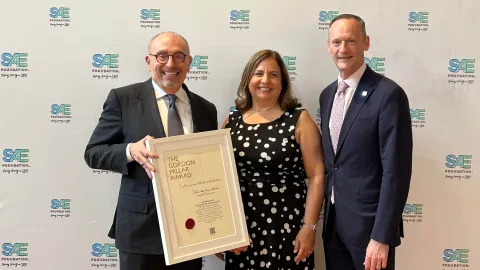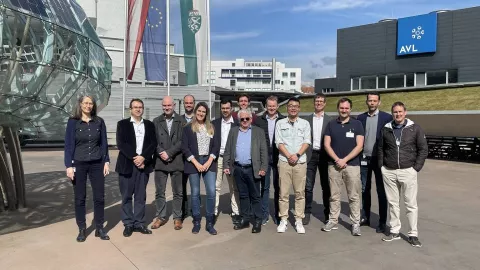1,000th AVL Chassis Dynamometer handed over to ŠKODA
- EN,
AVL delivered its 1,000th chassis dynamometer to ŠKODA. The jubilee edition is the main component of a new chassis dyno laboratory located in the parent plant of the Czech car manufacturer.

AVL delivered its 1,000th chassis dynamometer to ŠKODA. The jubilee edition is the main component of a new chassis dyno laboratory located in the parent plant of the Czech car manufacturer. Urs Gerspach, Executive Vice President AVL Test Systems and Global Operations: “We offer our customers complete and future-oriented solutions for emission testing – as such, the modern laboratory is excellently suited for the optimization of existing technologies and the development of new propulsion concepts, especially with regard to electrification.”
Real road tests under extreme and reproducible environmental conditions are now part of day-to-day business and form the basis for reliable test results. The AVL ROADSIM all-wheel drive chassis dynamometer which has just been handed over to ŠKODA will meet the latest requirements of modern and future research and development tasks. It allows the frontloading of road tests as well as the perfect interaction between real and virtual test environment. In combination with the comprehensive AVL development tools and the AVL engineering knowhow, it allows various road driving cycles to be simulated very precisely in the test lab.
“Thanks to the new chassis dyno laboratory, we have a highly modern tool, whose importance in the future will continue to grow, both in terms of ensuring the quality of our production cars and taking into account the development of extremely efficient propulsion units of the future”, says Martin Hrdlička, Chief of Chassis and Aggregate Development ŠKODA. Christian Strube, Board Member ŠKODA and responsible for R&D: “With this new state-of-the-art chassis dyno laboratory ŠKODA sets the trend in engines development and testing.”
The chassis dyno features one high-performance AC motor per axle, allowing the testing of a broad range of vehicles, from micro cars to premium cars, in continuous operation with a nominal power of up to 300 kW. Due to the highprecision package, the chassis dyno allows accurate and realistic road simulation through highly precise axis synchronization (±0.02 km/h). Also, the wide operative temperature range of between -30 °C and +60 °C allows the reproduction of extreme conditions.
AVL is a world-leading technology company specialising in development, simulation and testing in the automotive industry and other sectors such as rail, marine and energy. Through extensive research, AVL delivers concepts, technology solutions, methodologies and development tools for sustainable, safe and advanced mobility and beyond.
AVL supports international partners and customers in sustainable and digital transformation, with a focus on electrification, software, AI and automation. AVL also supports companies in energy-intensive sectors on their way to green and efficient energy generation and supply.
For more information: www.avl.com


- EN,

- EN,

- EN,
Stay up-to-date as a journalist with our latest press releases concerning company updates, research projects, our latest developments, and more.
Download our fact sheet to get a comprehensive overview about what we do as well as our latest company figures.
Get in touch with our Press-Team
For all press and media enquires please email: